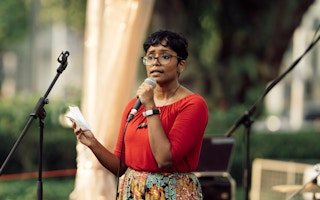When I think of what I care about, I start with my loved ones. You may think I’m talking about my family, friends, but I’m also thinking of the places I treasure – the old Stamford library, a patch of grass in Toa Payoh (that is no longer there) and Peace Centre… I think of our mousedeer, colugos and snakes. They make me feel home in Singapore.
To continue reading, subscribe to Eco‑Business.
There's something for everyone. We offer a range of subscription plans.
- Access our stories and receive our Insights Weekly newsletter with the free EB Member plan.
- Unlock unlimited access to our content and archive with EB Circle.
- Publish your content with EB Premium.
And I feel the heartbreak when my loved ones are uncared for. Much of Dover forest was razed down in a day. What was forest suddenly became naked orange soil. I stood watching from my East-West line train, thinking about the eagles and fungus beetles losing their homes so we can build homes for ourselves.
I am proud of Singapore and how far we have come. But is this enough? As a land reclamation researcher, I see how changes to the land make many of us feel disconnected from this land we all belong to – I think of the coasts of this island nation that were reclaimed and remade. I think of how this cost us our fish, natural beauty and our coastal kampongs. This is a wound that will fester if we don’t come back to our spirit of care.
When I say ‘care’, what comes to your mind?
I want to propose three ways of caring better in a time of climate breakdown.
One: Fight for what we hold sacred.
It seems that our precious nature is often the first to go in the name of development. Our forests are often too easily written off as unimportant. Why do we have to go places like Borneo and Australia for wilderness when we live in a biodiversity hotspot? We are home to precious wildlife who are increasingly losing their homes to make way for “a better life for Singaporeans”. Old trees are the lungs of our country and I worry we are becoming an asthmatic nation. I am proud of the defenders protecting spaces like Bukit Brown, Chek Jawa and Ground-Up Initiative. I want a Singapore that holds our biodiversity as sacred, where we plant forests that are left to grow old and ancient for our great-great grandchildren to marvel at. A Singapore where we can resist talk of tradeoffs that devalue nature: let’s not trade our long-term liveability for short-term returns.
Two: Being better regional environmental neighbours.
We need to go beyond Singapore to think about our role in the region. We are small but powerful. Our practices of importing sand can have incredible unintended effects. Sand dredged from rivers kills coastal creatures, devastating rural livelihoods. Our banks are still financing coal plants and palm oil plantations across Southeast Asia. We live in a region highly vulnerable to sea level rises and heat. We are already feeling the heat. How can our importing and financing practices have stronger accountability mechanisms? I dream of a Singapore where we sustain ourselves by sustaining our neighbours, recognising that we cannot be healthy when our neighbours are fighting for their basic rights.
Three – Reconsider what is progress
Our national value systems of economic pragmatism and endless growth are increasingly incompatible with the climate collapse we are living in. We end up giving free passes to our biggest emitters in the name of a good life for all. However, we have grown in a way that has been good for an increasingly smaller group of people.
Environmental economists around the world are asking us to reconsider what progress is, and whether it should be about meeting our needs within the resources of our planet. Defined this way, Singapore is actually quite far away from progress – we are overconsuming while many are not able to meet their basic needs in a time of inflation and recession.
I want us to dream together here: Can we realise a Singapore that lives within our planetary means?
To me, it all comes back to the land. When we want to grow more than we want to care for this land, our climate actions become over-focused on policy, economics, rather than our everyday needs and realities. When they don’t come from our values of care, our actions run the risk of being greenwashed and diluted. We are dangerously close to that reality already.
Let’s bring climate action back to us, and root it in care. I see each of us as a sapling: when we grow and act together, we can become an old-growth forest nurturing our every future generation.
Madhumitha Ardhanari is a sustainability strategist and researcher. She is author of a paper on Singapore, sand extraction and its environmental and social impacts.











